Here We Think - Blog Posts
“6) Tolkien’s hero was average, and needed help, and failed. This is the place where most fantasy authors, who love to simultaneously call themselves Tolkien’s heirs and blame him for a lot of what’s wrong with modern fantasy, err the worst. It’s hard to look at Frodo and see him as someone extra-special. The hints in the books that a higher power did choose him are so quiet as to be unnoticeable. And he wouldn’t have made it as far as he did without his companions. And he doesn’t keep from falling into temptation. A lot of modern fantasy heroes are completely opposite from this. They start out extraordinary, and they stay that way. Other characters are there to train them, or be shallow antagonists and love interests and worshippers, not actually help them. And they don’t fail. (Damn it, I want to see more corrupted fantasy heroes.) It’s not fair to blame Tolkien for the disease that fantasy writers have inflicted on themselves. […] Fantasy could use more ordinary people who are afraid and don’t know what the hell they’re doing, but volunteer for the Quest anyway. It’s misinterpretation of Tolkien that’s the problem, not Tolkien himself.”
—
“Tolkien Cliches,” Limyaael
(via mithtransdir)
The whole point of The Lord Of The Rings… like, the WHOLE POINT… is that it is ultimately the hobbits who save the world. The small, vulnerable, ordinary people who aren’t great warriors or heroes.
Specifically, Sam. Sam saves the world. All of it. The ultimate success of the great quest is 100% due to a fat little gardener who likes to cook and never wanted to go on an adventure but who did it because he wasn’t going to let his beloved Frodo go off alone. Frodo is the only one truly able to handle the ring long enough to get it into Mordor - and it nearly kills him and permanently emotionally damages him - but Sam is the one who takes care of Frodo that whole time. Who makes him eat. Who finds him water. Who watches over him while he sleeps.
Sam is the one who fights off Shelob.
Sam is the one who takes the Ring when he thinks Frodo is dead.
Sam is the one who strolls into Orc Central and saves Frodo by sheer determination and killing any orc who crosses him. (SAM THE GARDENER GOES AND KILLS AN ACTUAL ORC TO GET FRODO SOME CLOTHES LET’S JUST THINK ABOUT THAT). And then Sam just takes off the Ring and gives it back which is supposed to be freaking impossible and he barely even hesitates.
Sam literally carries Frodo on the last leg of the journey. On his back. He’s half-starved, dying slowly of dehydration, but he carries Frodo up the goddamn mountain and Gollum may get credit for accidentally destroying the ring but Sam was the one who got them all there.
Sam saved the world.
And let’s not forget Pippin and Merry, who get damselled out of the story (the orcs have carried them off! We must make a Heroic Run To Save Them!) and then rescue themselves, recruit the Terrifying Ancient Powers through being genuinely nice and sincere, and overthrow Saruman before the ‘real’ heroes even get there.
Let’s not forget Pippin single-handedly saving what’s left of Gondor - and Faramir - by understanding that there is a time for obeying orders and a time for realizing that the boss is bugfuck nuts and we need to get help right now.
Let’s not forget Merry sticking his sword into the terrifying, profoundly evil horror that has chased him all over his world because his friend is fighting it and he’s gonna help, dammit and that’s how the most powerful Ringwraith goes down to a suicidally depressed woman and a scared little hobbit.
Everything the others do, the kings and princes and great heroes and all? They buy time. They distract the bad guys. They keep the armies occupied. That is what kings and great leaders are for - they do the big picture stuff.
But it is ultimately the hobbits who bring down every villain. Every one. And I believe that that is 100% on purpose. Tolkien was a soldier in WWI. His son fought in WWII. (And a lot of The Lord Of The Rings was written in letters to him while he did it.)
And hey, look, The Lord Of The Rings is about ordinary people - farmers, scholars, and so on - who get pulled into a war not of their making but who have to fight not only because their own home is in danger but so is everyone’s. And they’re small and scared but they do the best they can for as long as they can and that is what actually saves the world. Not great heroes and pre-destined kings. Ordinary people, doing extraordinary things because they want the world to be safe for ordinary people, the ones they know and the ones they don’t.
Ordinary people matter. They can save the world without being great heroes or kings or whatever. And that is really important and I get so upset when people miss that because Aragorn and Legolas and Gimli and Gandalf and all the others are great characters and all but they are ultimately a hobbit delivery system.
It is ordinary people doing their best who really change the world, and continue doing so after the war is over because they have to go home and rebuild and they do.
If nothing else, I have to reblog this for the phrase “hobbit delivery system.” So accurate it hurts.
(via elenilote)
What I love too is how even the foretold king and the assorted great heroes themselves all come to recognize that their main (and by the end, only) role is to distract Sauron. To the point that by the end they’re all gathered up before the black gates of Mordor in order to keep his attention focused on them, with only the hope - not the certainty - that they can buy Frodo whatever remaining time he needs, if he’s even still alive.
One thing the movies left out but has always been such a key part of the books for me was how when the hobbits returned home, they found that home had been changed too. The war touched everywhere. Even with all they did in far-off lands to protect the Shire, the Shire had still been damaged, both property and lives destroyed, and it wasn’t an easy or simplistically happy homecoming. They had to fight yet another battle (granted a much smaller one) to save their neighbours, and then spent years in rebuilding.
(via garrusscars)
In many ways, the entire POINT is that homecoming. A quest, an adventure, is defined by the return home, and the realization that not only have YOU changed, so has your home.
(via mymyriadmusings)
“My friends, you bow to no one.”
(via sorrelchestnut)
@daisyfornost
(via roselightfairy)
if anyone is need of a long, entertaining adventure with a hero who never set out to be a hero but was just TRYING TO DIG A TUNNEL DAMMIT, Ursula Vernon’s Digger and its delightful wombat heroine might be up your alley.
(via beatrice-otter)
this is all so good and important i only have to add as i am contractually obligated to do that gollum didn’t “accidentally” destroy the Ring, frodo’s geas took effect and kicked his ass when gollum broke his word, so the credit for that goes back to Frodo again who absolutely anticipated he would do so and set up the geas for just that reason
So this is entirely @tygermama's fault
HOKAY, SO. This the earth … I mean, no.
Let’s talk about Éowyn Éomundsdaughter for a bit, shall we?
Keep reading
Low key I'm kinda bored of and annoyed by the preponderance of works that have Boring If Not Outright Malevolent Angels on one side and Nuanced, Charismatic, And Honestly Not Evil Demons because it just seems like a perpetuation of the idea that good is fundamentally flat or banal or not even good at all, that Goodness is something performed to achieve something else, usually power or control. In fact, I don't object to nuanced demons so much as the imbalance (only the "evil" side is allowed to be anything approching, well, approachable.)
But then I'm like "well identification with monsters is something that marginalized groups often feel because it forces us to question what is monstrous, so the idea of finding compassion and humanity in those deemed inherently unforgivable is actually very powerful and subversive"
But then I'm like "but is it subversive or is it laziness? It's hardly revolutionary at this point, it's like people making children's toys scary. It's supposed to have a tension between what something should be (childlike, innocent) and making it wicked. But now it's so common that dolls are often considered inherently creepy. So where's the subversion in a creepy doll? There's none. Where's the subversion in mean Angels or angels who have no interest in or love for humanity?"
But then I'm like "well but aren't angels traditionally destroying cities and saying Be Not Afraid?"
And I'm like, again just to myself as I pace my kitchen, "I mean YEAH but they're also like flaming wheels or whatever, I'm not sure how much these works are genuinely interested in angel mythology"
Then as I make coffee for myself, I think, "angels represent the traditional hierarchy, the traditional Christian dogma, and therefore are stand ins for the authority that we must question"
But then, as I realize we are out of sugar and my coffee is therefore ruined and am thus more susceptible to thinking there are demonic forces at work in this world, I go, "but demons in these stories aren't systemically kind. They're just cool. They're individuals and help individuals if they feel like it. In these stories, there's no mass concern for all of humanity really."
And then I conclude, "maybe angels are written cruelly because the world seems cruel and therefore there cannot be a Divine force involved in our daily activities looking out for us. Demons are by their nature doomed to fail which makes stories where they try to do Good have a more natural conflict and also explains why things in the world aren't better. For if there were angels, a legion of angels, always at work, shouldn't things be better? But we don't know how the world could otherwise be. But it seems hard to argue that this is in fact the best of all possible worlds. So demons make an easier to identify with protagonist while also being powerful and having cosmic impact. I believe many stories doing their own take on angels and demons would benefit from truly trying to imagine angels and beings of love, rather than the cold and distant figures I often see in fiction, but I understand the framework behind that conception."
Then I add to myself, "of course since I'm mostly talking about like urban fantasy, it might also be that people just wanna fuck demons more."
There are so many things I love about the B plot of 1.03: “The Southern Air Temple”, the Agni Kai, Zuko’s obvious fury and helplessness, Iroh having Zuko’s back against Zhao, the way it’s made clear that the Fire Nation officer class does not respect Zuko, or see him as the heir to the throne, or even think there will be any retaliation if they mistreat him, not to mention the sheer economy of scenes that this massive amount of worldbuilding and character development is done in, but really one of my very favorite things is the shot of all of the enormous new Fire Nation navy vessels, and then there’s Zuko’s ship, heretofore shown as large and menacing through the eyes of the Gaang, completely dwarfed by them. The banished prince and his cute little toy boat, off to capture the Avatar.
George R.R. Martin: dragons are huge ferocious beasts who answer to a master
Tolkien: dragons are annoying, talking assholes
tbh nothing is weirder to me than manly grimdark dudebro lord of the rings bc it’s just??? the epitome of light and love to me???? no narrative embodies hope and gentleness and healing like lotr does why must you insist on talking to me about badass aragorn vs. useless frodo. that’s not the point brad
the fact that even all these years later, people are still arguing over Aang’s choice to not kill Ozai suggests that A. ATLA is the goddamn best and you just can’t recapture the lightning in a bottle that it was and, B. it’s really kind of disturbing how many people are obsessed with the idea that Aang should have committed murder.
You see a lot of this in the fandom. Constant debates about how Katara and Zuko’s quest for revenge was correct in the Southern Raiders (despite the narrative painting Katara’s choice at the end as a correct one), advocating for greater violence on Aang’s part, and so on. But a biggest, disturbing trend is for people to claim that Aang’s decision to not violate the most sacred principle of his people as being immature.
There’s a tendency nowadays to see violence as not just a solution, but the only solution. That the only way to resolve a problem is to end life; to hurt people. It’s called a cop out when Aang chooses to put his own existence on the line.
The implication, therefore, is that the people advocating this sincerely believe that the mature thing to do is to kill.
Similar in nature to posts talking about how superheroes not killing is weak.
And the idea here, of the willingness to kill as a sign of strength, and as the only real solution to anything, is a deeply disturbing and unsettling one.
If Aang had killed Ozai, it truly would have been the end of the Air Nomads, their most sacred spiritual law broken by their only surviving member. Because Aang would have sunk to the level of the man who had ordered his people killed in the first place, and that of the nation which carried it out.
But when he Energybent, he knew that if he failed, he would have died in the process, and Ozai with him. Not only was Aang willing to put his life on the line for his beliefs, he was genuinely willing to die rather than sacrifice who he was, and the last lingering remnant of the Air Nomads.
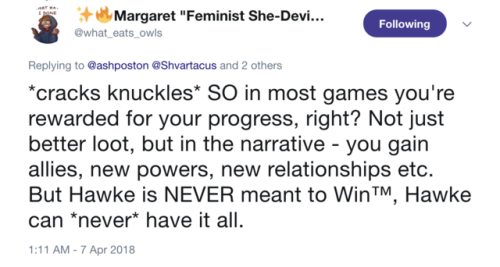
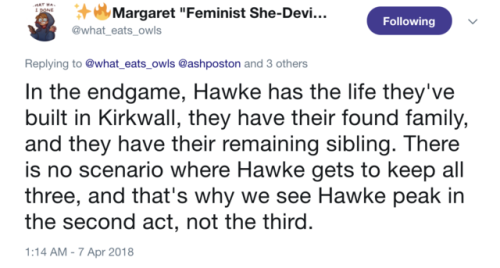
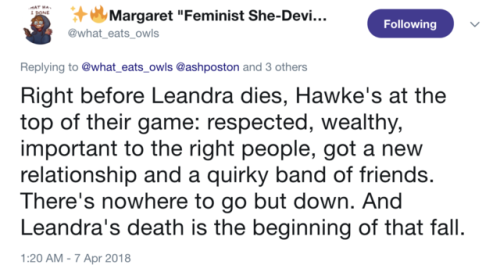
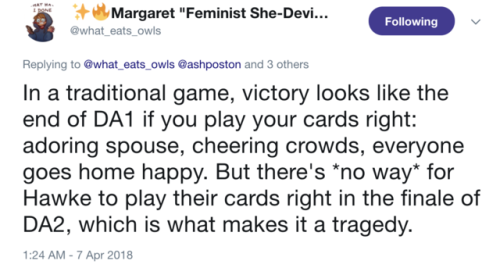
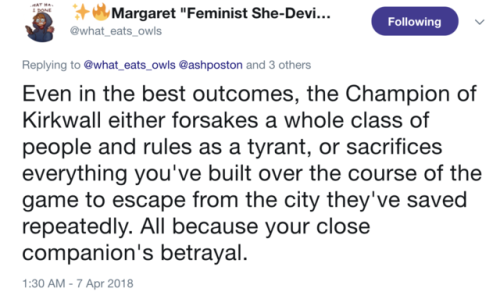
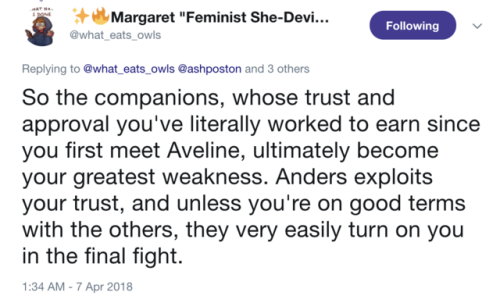
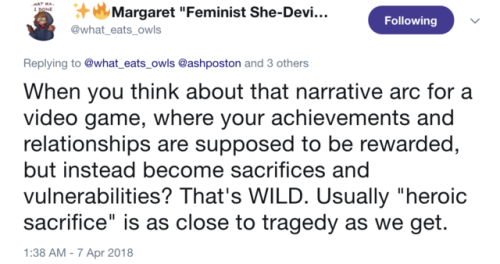
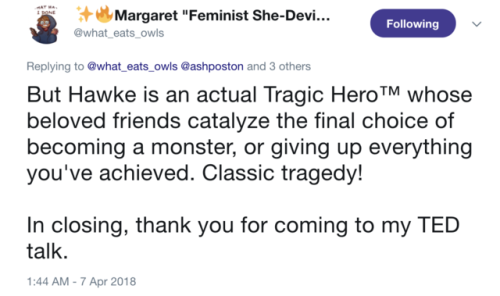
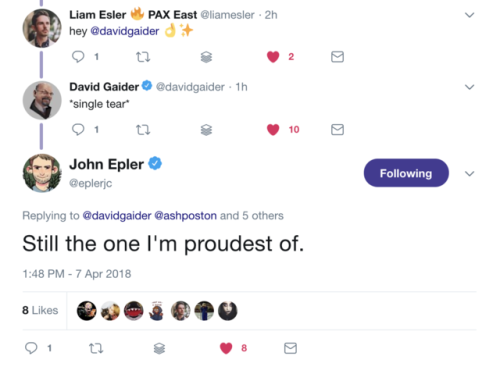
This is the single best take on Dragon Age 2 I’ve ever read and why I will defend it with my life AND TWO OF THE WRITERS BASICALLY CONFIRMED IT??
(Also everyone go follow Margaret Owen on twitter. she writes books.)
twitter thread here